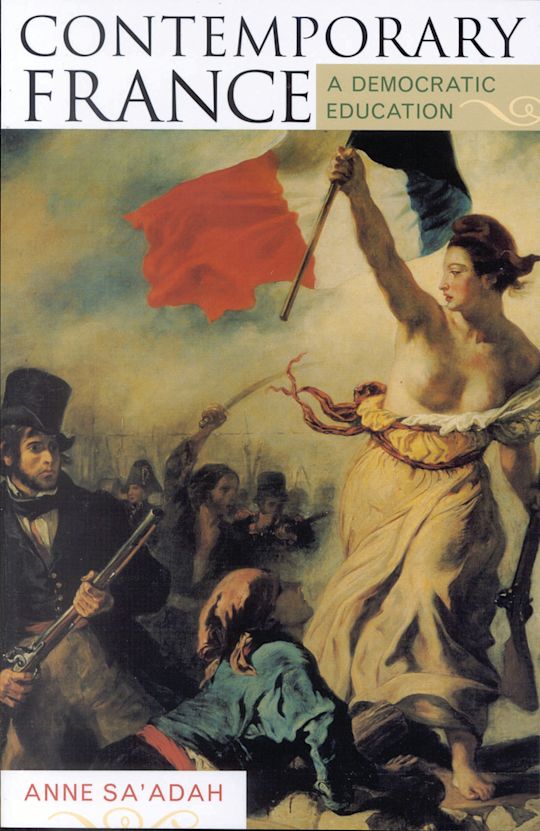- Home
- ACADEMIC
- Politics & International Relations
- Politics - Other
- Contemporary France
For information on how we process your data, read our Privacy Policy
Thank you. We will email you when this book is available to order
Buy from Bloomsbury eTextBooks
You are now leaving the Bloomsbury Publishing website. Your eBook purchase will be with our partner https://www.vitalsource.com.
Your credit card statement will show this purchase originating from VitalSource Technologies. They will also provide any technical assistance you might require.
You must sign in to add this item to your wishlist. Please sign in or create an account
Description
This dynamic introduction to contemporary France analyzes the problems and possibilities of democracy in a globalizing world. France was present at the creation of modern democratic politics in the eighteenth century, yet democratic stability has often eluded the country. Now, as established and new democracies everywhere confront the challenges of globalization-cultural diversity, economic change, the erosion of state sovereignty-France's rich and varied experience contains valuable lessons about what works (democratically speaking) and what does not. Anne Sa'adah describes actors, beliefs, institutions, and policies; she also interprets democratic politics in France in general and explores why and with what political consequences so many people in France experience globalization as a harbinger of national decline. The author is especially attentive to the importance of historical legacies, especially of the centralizing logic of the Old Regime, the Revolution and the expansionary dynamic and internal instability it spawned, World War II, and decolonization. Pivotal chapters focus on France's often dysfunctional system of representation, state-society relations, group politics, social policy, and France's role in Europe and the world.
Table of Contents
Part 2 Part I: The Historical and Cultural Foundations of Contemporary French Politics
Part 3 Chapter 1: Le Miracle de la France: French Nationalism
Chapter 4 Nationalism and the Left: From the Revolution to the Commune
Chapter 5 Nationalism and the Right: From the Boulanger Affair to the Great War
Chapter 6 World War I
Part 7 Chapter 2: World War II and Its Legacies
Chapter 8 France, 1939-1945
Chapter 9 Vichy, a Past That Stayed
Chapter 10 The Legacies
Part 11 Chapter 3: Decolonization and Its Sequels
Chapter 12 The Algerian War and Republican Institutions
Chapter 13 The Empire Strikes Back: The Algerian War and French Identity
Chapter 14 Epilogue
Part 15 Chapter 4: Putting Sovereignty First: The Gaullist Vision
Chapter 16 The Gaullist Conception of State Sovereignty
Chapter 17 Charting Policy
Chapter 18 The Gaullist Vision: An Assessment
Part 19 Part II: The Institutions, Processes, and Practices of French Politics
Part 20 Chapter 5: Political Representation in the Fifth Republic: Back to the Marais?
Chapter 21 The Reconstruction of the Left, 1958-1986
Chapter 22 The Failed Recomposition of the Right, 1958-1981
Chapter 23 Institutional and Partisan Confusion, 1984 to the present
Chapter 24 Conclusion
Part 25 Chapter 6: State-Society Relations in France: An Introduction
Chapter 26 Politics and Markets: The Dirigiste State
Chapter 27 Selective Capitalism: Social Structure
Chapter 28 Capitalism and the Republican Compromise: Ideological Ambiguities
Chapter 29 Postwar Economic Growth and Social Change
Chapter 30 Conclusion
Part 31 Part III: Contemporary Dilemmas
Part 32 Chapter 7: Reinventing France: Social Change, Identity, and Citizenship
Chapter 33 Winners and Losers in the New France
Chapter 34 The New Politics of Identity
Chapter 35 Conclusion
Part 36 Chapter 8: Getting Past Sovereignty: An Impossible Task?
Chapter 37 Rethinking the Means of French Foreign Policy: Sovereignty, Supranationality, and Multilateralism
Chapter 38 Testing the Possibilities of French Power: The Yugoslav Disaster
Chapter 39 Testing the Possibilities of Supranational Action: Social Protection
Chapter 40 Conclusion
Part 41 Appendix A: A Chronology of French Regimes
Part 42 Appendix B: The Fifth Republic: The Presidents and Their Prime Ministers
Part 43 Appendix C: Electoral Laws: An Introduction
Part 44 Appendix D: Who's Who in French Politics
Product details
| Published | 01 Oct 2003 |
|---|---|
| Format | Ebook (Epub & Mobi) |
| Edition | 1st |
| Extent | 336 |
| ISBN | 9780585455013 |
| Imprint | Rowman & Littlefield |
| Series | Europe Today |
| Publisher | Bloomsbury Publishing |
About the contributors
Reviews
-
This well-informed and sympathetic interpretive essay employs an unusual topical arrangement but covers important themes of French history and culture, institutions and processes, and current problems. Highly recommended.
Choice Reviews
-
Anne Sa'adah has penned a wide-ranging and highly readable textbook. Of particular value is the textbook's historical perspective. Sa'adah shows how the constituent pieces of France's historic identity-Republicanism, Gaullism, colonialialism, and statism-continue to structure political debates and struggles even in today's supposedly 'global,' 'post-national' era.
Jonah Levy, University of California, Berkeley
-
I was very impressed with Contemporary France because it gives students a grounding in French history since the Revolution that explains the country's ongoing political divisions and attitudes. At the same time, it covers the institutions of the Fifth Republic and shows them at work, trying to resolve contemporary problems. Easy to follow without being patronizingly simple, it is a book that beginners can understand and the better-informed can appreciate.
Paul H. Lewis, Tulane University
-
This book provides the perfect entry into French politics for undergraduates. Along with being beautifully written, it manages to convey complex ideas and trends in French society and history in a way that is appealing and accessible to undergraduates.
Janet Laible, LeHigh University
-
Students will find her list of recommended readings, including novels and documents, quite helpful, while professors will appreciate her efforts to place the French experience in a global context.
H-France Review
-
A remarkably adept analysis built on a wide array of primary sources, including speeches, memoirs, press clippings, and government reports.
W. Brian Newsome, Alfred University



































